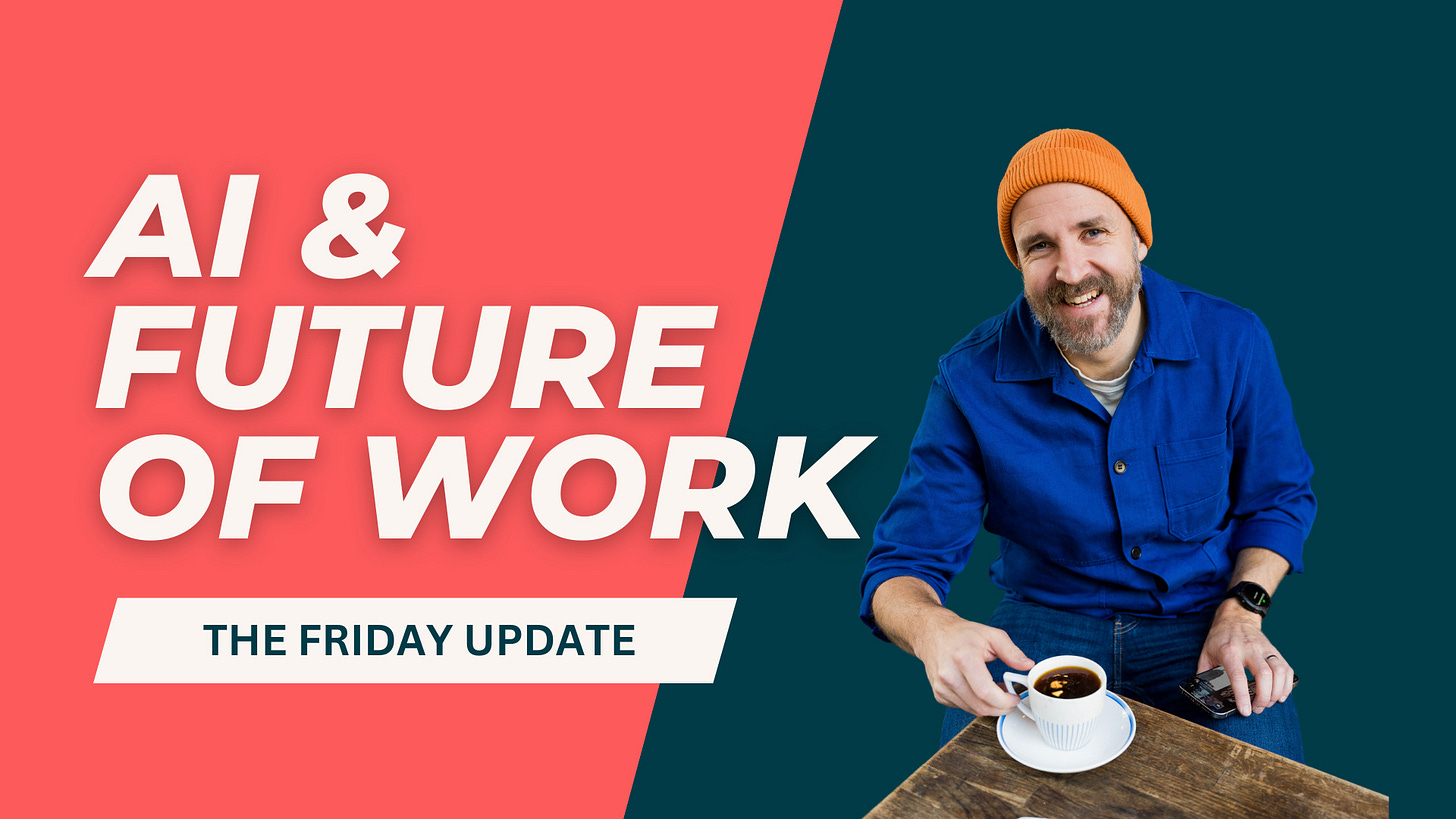AI & Future of work - 16 May 2025
Why big organisations lag behind on AI adoption.
Welcome to FullStack HR, and an extra welcome to the 19 people who have signed up since last edition.
If you haven’t yet subscribed, join the 9300+ smart, curious and like-minded HR people by subscribing here:
Happy Friday, everyone!
What an intense week it's been! Among other things, I delivered an AI inspiration session for Toast in Boston. Big shout-out to all the Toast employees who found their way here! It was great chatting with you all!
Thinking your HR team could use some true HR-AI inspiration?
Don't hesitate to reach out!
That's exactly what I do. I've done these sessions all over the world, and I'd love to do them anywhere, digitally or in person.
1. Salesforce Study Predicts 23 % of Jobs Will Pivot to “Agentic AI” by 2027
Salesforce surveyed 200 CHROs and forecasts a 327 % surge in autonomous AI-agent deployments within two years, fuelling productivity gains of 30 % and labour-cost savings of 19 %.
Why it matters for us in HR: These numbers make large-scale reskilling and redeployment programmes non-negotiable. HR has to lead the transition from head-count plans to capability plans, fast.
Read More →
2. Fortune: Only One in Four AI Projects Hits Its ROI Target
An IBM-backed survey of 2 000 CEOs finds that just 25 % of AI initiatives deliver the promised return, citing data quality gaps and skills shortages as the main blockers.
Why it matters for us in HR: ROI failures are often people problems in disguise, missing skills, weak change management and unclear governance. HR can rescue value by driving AI literacy and taking owner ship for making sure it’s not “only an IT"-project.
Read More →
3. “AI Will Replace Skills, Not Careers—Unless You Let It”
The Percolator argues that generative AI is eating discrete skills rather than entire jobs and urges leaders to build meta-skills like problem framing and ethical judgment.
Why it matters for us in HR: Skill-based planning beats head-count planning. Clear taxonomies and personalised upskilling pathways will be the safety net for workers and the growth engine for firms.
Read More →
4. Microsoft to Cut 7 000 Roles as It Redirects Investment Toward AI
Microsoft confirmed plans to reduce about 3 % of its workforce across regions to flatten management layers and double down on Copilot, Azure and Windows AI features.
Why it matters for us in HR: Do we see a pattern emerging here? Large restructurings explicitly linked to AI. IBM automated hundreds of HR roles last week, and now Microsoft is following suit. HR must claim a seat at the strategy table, shaping how skills are redeployed, which roles sunset and what new capabilities are built. If we lead the reskilling roadmap, these shifts can become growth stories rather than scars.
Read More →
5. Sam Altman: Big Organisations Lag on AI Because “We Get Stuck in Old Routines”
In a Sequoia AI Ascent keynote published three days ago, the OpenAI CEO said culture, team size and behaviour, not technology, explain slow enterprise adoption and stressed the need for smaller, cross-functional squads to unlock AI value.
Why it matters for us in HR: Even the builders of AI point to behaviour change as the bottleneck. HR owns culture, change management and organisational design, so our seat at the strategy table is non-negotiable.
Watch →
6. Moderna Combines Tech and HR Into One “People & Digital” Function
The biotech innovator folded IT and HR under Chief People & Digital Technology Officer Tracey Franklin after building 3 000 internal GPTs that automate routine work.
Why it matters for us in HR: I really like this example and I think this is the right way to go about it. Because it signals that employee data, AI tooling and experience design now sit on the same strategic spine. HR leaders who co-own digital strategy gain both influence and budget.
Read More →
7. “The AI Jobs Crisis Is Here Now,” Warns Brian Merchant
The Blood in the Machine report details how Duolingo, creative studios and public agencies are already replacing writers, translators and junior analysts with generative AI.
Why it matters for us in HR: The piece reframes AI displacement as a series of managerial cost-cutting choices, not techno-destiny. HR can challenge blanket automation with evidence on quality, ethics and brand risk.
Read More →
8. Ramp AI-Spending Index: OpenAI Tops Enterprise Wallet Share
Corporate-card data from 30 000 US firms shows OpenAI gaining new-customer growth faster than any other vendor, with niche tools like Turbopuffer and Jasper close behind.
Why it matters for us in HR: Real spend data proves AI is moving from pilot to production. HR must partner with finance on skills enablement, safe-use policies and change-management to avoid shadow IT.
Read More →
9. UNLEASH America Panel Urges a “Work-to-Skill” Mindset
HR leaders from SAP, Microsoft and NYU highlighted mixed human-AI teams and data-driven learning as the next competitiveness frontier.
Why it matters for us in HR: Job architectures will pivot from roles to tasks. HR must modernise competency frameworks, talent marketplaces and L&D to match dynamic skill demand.
Read More →
10. Klarna’s AI Assistant Now Does the Work of 800 Customer-Service Agents
Klarna told CIO.com that its generative-AI bot has scaled from replacing 700 to 800 roles, even as it pilots an on-demand micro-workforce for complex queries.
Why it matters for us in HR: There has been so much debate whether this Klarna AI assistant is real or not. Whether they are actually doubling down on their AI efforts. But as we revealed in this article, and also in tweets by their CEO, they are not abandoning AI. It's just that for some reason, we can't take in two realities at the same time. AI is making a dent for Klarna and humans are making a dent for Klarna.
Read More →


